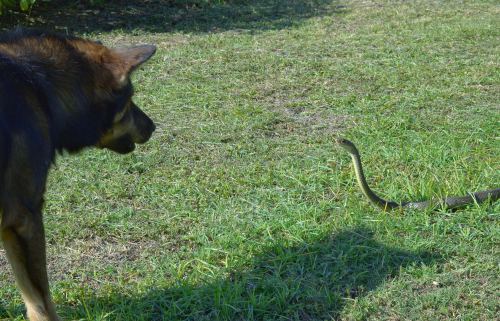Dogs & Snake Bites
Summer is right around the corner. The warmer months not only yield sunshine and flowers, but snakes come out as well. These cold-blooded animals can negatively impact the well-being of our four-legged friends. Keep in mind that they can be found in any climate, from deserts and forests to swamplands. We will outline the important details about treating a snake bite on a dog.
Why do snakes bite? They do not have limbs or claws, so they bite out of defense. We all know that dogs are curious. If they encounter a snake and will not leave it alone, they may get bitten. The severity of the situation will depend on a number of factors that include the following:
- Type of snake. Not all snakes are poisonous. However, some non-poisonous snakes have a more painful bite which can cause an infection. A poisonous snake does not always inject venom during a bite. When they do, it can be fatal, though. Some snakes also have a slow-acting venom with negative effects that may not immediately clear.
- Amount of venom. Snakes have fuller venom glands during warmer months, resulting in a more damaging bite.
- Area of the bite. If the bite is close to the heart, it will spread quickly through the body.
It is crucial to recognize the symptoms of a snake bite. Keep an eye out for your dog if they experience any of the signs mentioned below:
- Sudden weakness or collapse
- Diarrhea or vomiting
- Excessive salivation
- Dilated pupils
- Trembling
Seek veterinary assistance for snake bites. The good news is that most pets will survive a snake bite if attended to immediately. You may be asked to identify the type of snake. Please do not attempt to catch or kill it. If you suspect that the snake is harmful, contact Animal Control to handle the situation.
Depending on your veterinarian’s assessment, antivenom may be administered. Your dog may also need to be hospitalized for additional support care. Snake bites can be prevented. Keep your backyard clean and have your dog on a leash. A snake bite can be life-threatening for your pet, so it is essential to avoid snakes.



